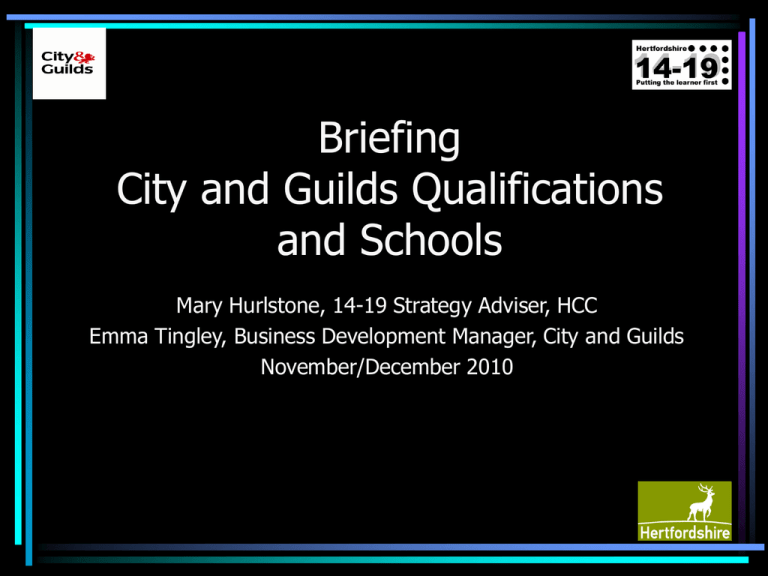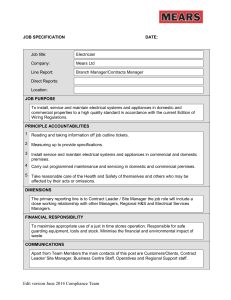Briefing City and Guilds Qualifications and Schools
advertisement

Briefing City and Guilds Qualifications and Schools Mary Hurlstone, 14-19 Strategy Adviser, HCC Emma Tingley, Business Development Manager, City and Guilds November/December 2010 The story so far …. The background • City and Guilds – traditional market has been FE, work-based learning providers and employers, not schools. • “City and Guilds have over 99% recognition with employers for vocational qualifications and without doubt are the only awarding organisation who offers occupational currency.” A driver for change • Introduction of Foundation Learning (Entry Level/Level 1 provision) with 3 components – Personal and Social Development – Functional Skills (Maths, English and ICT) – Vocational/Subject Learning • Emphasis on destination-led programmes for learners, with accredited outcomes and progression pathways • Introduction of Qualifications and Credit Framework (QCF) and bite-size units making up awards, certificates and diplomas Encompassing existing programmes • • • • Practical learning opportunities at FE Colleges KS4 Engagement programmes e.g. Princes’ Trust Alternative provision (as found in the Herts Directory) Vocational provision at Level 1 e.g. child development and well-being, digital applications • Work-related and life skills programmes e.g. extended work experience • Personal development and volunteering programmes • Programmes running in special schools egg independent living, entry level qualifications in core subjects 7546 Employability and Personal Development – covering all aspects of economic and personal well-being From an Entry 2 award - Level 2 Diploma and beyond An example: At Level 1, 2 mandatory units: Planning for Progression and Effective skills, qualities and attributes for learning and work Plus a myriad of others to choose from. They include: Community action, Candidate’s project, Environmental awareness Valuing equality and diversity, Dealing with problems in daily life Managing personal finance, Work-based experience Enterprise activity: producing products or services To achieve the Award – 2 mandatory units + one other with a credit value of 3 7546: a cost effective approach • At least 250 units to choose from (some shared units i.e. written by other awarding organisations and purchased by City and Guilds) – a ‘logistic nightmare’ • Suggest a bank of appropriate units to ensure that the offer is: – Cost effective and – Protects achievement and funding post-16 Finding the detail Go to: www.cityandguilds.com/employability Or www.cityandguilds.com/24758.html Handbooks for each level, with information on each unit, credit value, guided learning hours and assessment Themed booklets e.g. enterprise, independent living to help group the units A real bonus • City and Guilds accredit skills; skills that employers are seeking so schools are likely to engage more employers in supporting delivery pre-16 • You can apply many different learning situations and activities as evidence for unit accreditation • As with many qualifications assessment is not by a test portfolio including testimonials, photographs, video clips, observational sheets, artefacts etc • Do not require occupational competency to run this qualification - ‘If you are a teacher you are competent!’ • Free training and consultancy from City and Guilds Involvement in a groundbreaking national pilot • HCC will act as the hub and save each school having to pay a registration fee of £1,500. Approval given by us for each school to be a registered centre. • No qualification fee for Functional Skills or the Employability and Personal Development Qualification (7546) at all levels • Schools will pay a learner registration fee and for each unit. • Introduction of other qualifications across providers would incur just one fee (£200) – savings in excess of £20,000 per qualification • Access to Smartscreen for on fee (£270) instead of per institution Roles and Responsibilities The school’s commitment: • A named Curriculum leader and course leader i.e. a link person • Register your own learners • Enter results • Pay invoices • Issue the certificates • Deal with claims • Send sample work from learners for moderation • Honest feedback on what has worked well, even better if … A commitment from 14-19 Teams in HCC • Act as the centre and formal contract holder • Named link person i.e. Mary Hurlstone • People with a background in assessment, administration and quality assurance • Issue a statement that ‘approves’ each school • Plan with City and Guilds the programme of monitoring and verification • Communicate this to schools, together with a programme of training and support • Link quality assurance to the quality assurance process in place • Keep records of activity e.g. models of best practice City and Guilds’ commitment • Provide the criteria for approved centres • Monitor first-hand the centres (particularly through cohort 1) • Remote sample the learners work • Receive and answer direct queries from school contacts • Liaise with the link person in HCC • Visit schools and offer consultancy • Provide free trainers (and venue – St Ives) Frequently asked questions Your questions answered • How long does the registration last? • What is the deadline for registering? • How ‘active’ do we need to be to apply to be a registered centre? • What vocational qualifications can we offer, if any? • What level does the qualification have to offered at? • Can independent alternative providers become centres? • Anything else? Contacts • Emma Tingley, Business Development Manager, City and Guilds emma.tingley@cityandguilds.com 01480 308300 or 07977 265102 • Mary Hurlstone, 14-19 Strategy Adviser mary.hurlstone@hertscc.gov.uk 07785 594701











